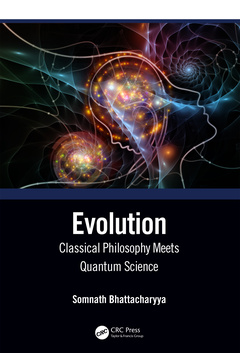Description
Evolution
Classical Philosophy Meets Quantum Science
Author: Bhattacharyya Somnath
Language: English
Subjects for Evolution:
Keywords
Magnetism; Energy; Space; Motion; Quantum Vortex; Sankhya Philosophy; Space Time Distortion; Vice Versa; SOC; Magnetic Forces; Attraction; Mass Energy Equivalence; Cooper Pairs; Spin Triplet State; Coherent Backscattering; Goddess Kali; Spin Orbit Interaction; Gapped Superconductor; Goddess Durga; Nv Center; Quantum Dots; Geometric Phase; Supermassive Black Hole; Superconducting Qubits; Electric Charge; BCS Theory; Josephson Junction; Orbital Angular Momentum; Finite Electric Field
· 17.8x25.4 cm · Hardback
Description
/li>Contents
/li>Readership
/li>Biography
/li>
This book reconceptualizes the ancient philosophy of 'dualism' and a 'trinity' applied to classical and quantum nonequilibrium phenomena. In addition to classical mechanics and electrodynamics, a remarkable connection of this philosophy with quantum mechanics is established, which can be useful for quantum computing and the development of quantum artificial intelligence. Packed with the recent theoretical models, quantum simulations of black holes, and experimental observations of quantum phase transitions, this book brings a holistic approach that can be useful to refine the concept of the 'Creation', i.e., the evolution of the Universe from the condensed state of matter, and explain the artificial vision. The approch is:
- Unique: Connects ancient philosophy, classical and quantum mechanics, materials, and the latest quantum technologies
- Novelty: High level of scientific interpretation of ancient philosophy, creation, interactions, and disorder
- Multidisciplinary: Guides students to learn quantum simulations and develop philosophical ideas
The book contains over ten years of in-depth research by the author on the ancient eastern (Indian) philosophy and the latest scientific research in condensed matter and quantum technology. This book will simplify the picture of ancient eastern philosophy, which can be read by the general audience, particularly undergraduate/postgraduate students interested in quantum information science without any mathematical treatment. However, some parts of the book will be ideal for senior academicians and professional researchers in both worlds.
Preamble: Philosophy through careful observation and self-realization—the birth of cycles. 1. Creation? A cosmic model: Birth of Matter and Mind: Two Cycles 2. Background/history—Understanding creation: Gods and Goddesses. 3. Life Begins on Earth—Creation of the Devices, Deities, and the Concept of God: Creation of Cycles 4. Theory of evolution—(Sankhya) Philosophy of dualism: Creation of a Cycle 5. Interactions at the Macroscale—Classical mechanics—Equilibrium and Rotation: One Cycle 6. Energy/Light and Space (Matter) Application in Condensed Matter Physics: Two Cycles 7.Condensed matter physics—Creation of particles—Bosonic vs. fermionic: One and a half cycle 8: Creation through interactions at the microscale—Quantum mechanics 9. Space–Time Distortion: Black holes, Condensates, and quantum devices 10. Quantum Simulation, Artificial Intelligence, and Vision . Conclusion References.
Somnath Bhattacharyya is currently a professor of physics specializing in quantum mechanics, quantum computing, and nanotechnology. Through his research activities, he has been privileged to have spent much of his life abroad, outside of his native country India. Thanks to his diverse background and extensive traveling, Somnath has been able to develop several fundamental ideas linking contemporary physics to eastern philosophy. This includes reinterpretations of topics such as Schrodinger’s cat paradox, light-matter interaction, and other foundational phenomena that have perplexed scientists for decades. Through his research, Somnath has constructed models linking such scientific theories with ancient concepts whose origins reach back to many centuries ago. Somnath’s studies however are not limited to just science; he has spent much time investigating one of the most abstract and elusive and yet fundamental subjects, the concept of god; as well as answering some of the most paramount, yet enduring questions about reality. Through examining a variety of artifacts displayed at various locations around the world, and numerous different religious and philosophical texts, in addition to several works dealing with metaphysics and mysticism; Somnath is uncovering invaluable information connecting and explaining some of the world’s most influential religions, philosophies, and ideas in very profound ways. His main interest lies in the understanding of ‘creation’. Somnath is the co-founder of the Society for Agni Vigyan Advancement (https://www.agnivigyan.com/) where he bridging the gap between science and philosophy. Through the display of his photos, he tries to simplify some of the complicated concepts of philosophy and science.




